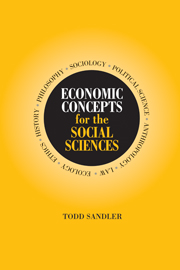Book contents
- Frontmatter
- Contents
- Table and Figures
- Preface
- 1 Economics without Apology
- 2 Back to the Future: Political Economy
- 3 In Another's Shoes: Games, Strategies, and Economics
- 4 It Takes Two or More: Public Economics and Collective Action
- 5 Government for the Politician? Public and Social Choice
- 6 Institutions Matter: The New Institutional Economics
- 7 Knowledge Is Power: Asymmetric Information
- 8 Everything Ties Together: General Equilibrium
- 9 Laboratory Economics: Of Rats and Men
- 10 Before Yesterday and Beyond Tomorrow: Intergenerational Economics
- 11 Fish, Space, and Spaceship Earth: Bioeconomics and Interdisciplinary Economics
- 12 Crystal Ball Economics: Rational Expectations
- 13 How Do We Get There from Here? Transition Economies and Policy Reforms
- 14 Economic Growth: Endogeneity, Institutions, and Other Concepts
- 15 Economic Visions of Future Horizons
- References
- Author Index
- Subject Index
4 - It Takes Two or More: Public Economics and Collective Action
Published online by Cambridge University Press: 14 May 2010
- Frontmatter
- Contents
- Table and Figures
- Preface
- 1 Economics without Apology
- 2 Back to the Future: Political Economy
- 3 In Another's Shoes: Games, Strategies, and Economics
- 4 It Takes Two or More: Public Economics and Collective Action
- 5 Government for the Politician? Public and Social Choice
- 6 Institutions Matter: The New Institutional Economics
- 7 Knowledge Is Power: Asymmetric Information
- 8 Everything Ties Together: General Equilibrium
- 9 Laboratory Economics: Of Rats and Men
- 10 Before Yesterday and Beyond Tomorrow: Intergenerational Economics
- 11 Fish, Space, and Spaceship Earth: Bioeconomics and Interdisciplinary Economics
- 12 Crystal Ball Economics: Rational Expectations
- 13 How Do We Get There from Here? Transition Economies and Policy Reforms
- 14 Economic Growth: Endogeneity, Institutions, and Other Concepts
- 15 Economic Visions of Future Horizons
- References
- Author Index
- Subject Index
Summary
For a moment, imagine yourself in a truly anarchic society with no rules or laws, no protection of property rights, no defense, no publicly provided goods or services, and no taxes. Would this society be paradise or a nightmare? Each morning, if you have not been murdered the night before, you would have a daunting decision: how to divide your time that day among providing for your needs, guarding the fruits of your past labors, and stealing from others. The greater the amount of time devoted to either guarding your “pile” or robbing others, the less would remain for productive activities that augment your overall wealth and that of society. Stealing or watching over your assets uses up scarce resources in an unproductive activity that reduces society's overall well-being. Under the best of circumstances, theft is a zero-sum game.
In this natural anarchic state, there would evolve a collective of individuals – perhaps thugs – who would specialize in providing protection in return for a share of the wealth of those being protected. These guardians would amass weapons to counter threats both within and beyond their society. Some of the additional goods, produced because you now have time released from having to watch over your assets, could pay the protectors. If the value of this tribute were less than the value of these additional goods, then both the protected and the protectors would gain from the arrangement.
- Type
- Chapter
- Information
- Economic Concepts for the Social Sciences , pp. 56 - 75Publisher: Cambridge University PressPrint publication year: 2001



